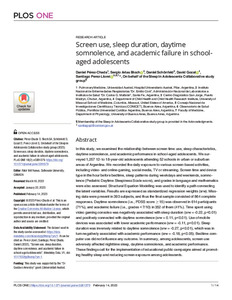Por favor, use este identificador para citar o enlazar este ítem:
https://repositorio.uca.edu.ar/handle/123456789/17349| Título: | Screen use, sleep duration, daytime somnolence, and academic failure in schoolaged adolescents | Autor: | Pérez Chada, Daniel Arias Bioch, Sergio Schönfeld, Daniel Gozal, David Pérez Lloret, Santiago |
Palabras clave: | VIDEOGAMES; JUEGO; RENDIMIENTO ACADEMICO; SUEÑO; SOMNOLENCIA; ADOLESCENTES; APRENDIZAJE | Fecha de publicación: | 2023 | Editorial: | Public Library of Science | Cita: | Pérez Chada, D. et al. Screen use, sleep duration, daytime somnolence, and academic failure in schoolaged adolescents [en línea]. PLoS ONE. 2023, 18(2): e0281379. doi: 10.1371/journal.pone.0281379. Disponible en: https://repositorio.uca.edu.ar/handle/123456789/17349 | Resumen: | Abstract In this study, we examined the relationship between screen time use, sleep characteristics, daytime somnolence, and academic performance in school-aged adolescents. We surveyed 1,257 12- to 18-year-old adolescents attending 52 schools in urban or suburban areas of Argentina. We recorded the daily exposure to various screen-based activities, including video- and online-gaming, social media, TV or streaming. Screen time and device type in the hour before bedtime, sleep patterns during weekdays and weekends, somnolence (Pediatric Daytime Sleepiness Scale score), and grades in language and mathematics were also assessed. Structural Equation Modelling was used to identify a path connecting the latent variables. Results are expressed as standardized regression weights (srw). Missing data were present in 393 subjects, and thus the final sample consisted of 864 complete responses. Daytime somnolence (i.e., PDSS score � 15) was observed in 614 participants (71%), and academic failure (i.e., grades < 7/10) in 352 of them (41%). Time spent using video gaming consoles was negatively associated with sleep duration (srw = -0.22, p<0.01) and positively connected with daytime somnolence (srw = 0.11, p<0.01). Use of mobile devices was associated with lower academic performance (srw = -0.11, p<0.01). Sleep duration was inversely related to daytime somnolence (srw = -0.27, p<0.01), which was in turn negatively associated with academic performance (srw = -0.18, p<0.05). Bedtime computer use did not influence any outcome. In summary, among adolescents, screen use adversely affected nighttime sleep, daytime somnolence, and academic performance. These findings call for the implementation of educational public campaigns aimed at promoting healthy sleep and reducing screen exposure among adolescents. | URI: | https://repositorio.uca.edu.ar/handle/123456789/17349 | ISSN: | 1932-6203 (online) | Disciplina: | MEDICINA | DOI: | 10.1371/journal.pone.0281379 | Derechos: | Acceso abierto | Fuente: | PLoS ONE 18(2): e0281379, 2023 |
| Aparece en las colecciones: | Artículos |
Ficheros en este ítem:
| Fichero | Descripción | Tamaño | Formato | |
|---|---|---|---|---|
| screen-use-sleep.pdf | 613,9 kB | Adobe PDF |  Visualizar/Abrir |
Visualizaciones de página(s)
73
comprobado en 27-abr-2024
Descarga(s)
17
comprobado en 27-abr-2024
Google ScholarTM
Ver en Google Scholar
Altmetric
Altmetric
Este ítem está sujeto a una Licencia Creative Commons

